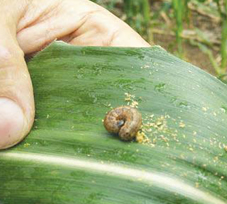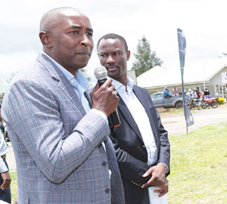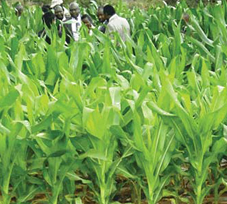Mr. Timothy Munywoki A multi-skilled Agronomist
 Who is Timothy Munywoki?
Who is Timothy Munywoki?
Am a multi-skilled agronomist with vast knowledge in general crop husbandry with a key focus on crop pests, disease diagnosis, product development, strategy management, marketing and Product development.
Why did you choose to be an agronomist?
I come from dry area and when I was a young boy I used to have a small kitchen garden which I had like 10 stems of kales. I used to apply farmyard manure and I would use like 5 litres per day to irrigate. To my surprise, at times the whole family would rely on my kitchen garden for food. From there I developed strong interest towards farming…
What would you point out as your strongest attribute that has made you succeed?
Am persistent, aggressive and hardworking. All this combined has contributed to my success.
In your experience, discuss some of the challenges cereal growers are facing?
There are several challenges that cereal farmers face. However, the major ones are climate change. Last year many farmers encountered losses due to insufficient rains. Rains patterns have changed although we anticipate this year to be a good year . Maize farmers are having challenges to control Fall Army Worms because the FAW products are above board in terms of costs. Controlling brome grass in cereal farms has since remained a challenge.
Read more ...
How Fall Armyworm Can be Beaten in Africa
 B.M. Prasanna, Director of the Global Maize Program at the International Maize and Wheat Improvement Center (CIMMYT), believes that the fall armyworm on the move in sub-Saharan Africa can be beaten. In this guest blog for Farming First, he outlines the actions that must be urgently taken to protect African harvests from the plight of this pest.
B.M. Prasanna, Director of the Global Maize Program at the International Maize and Wheat Improvement Center (CIMMYT), believes that the fall armyworm on the move in sub-Saharan Africa can be beaten. In this guest blog for Farming First, he outlines the actions that must be urgently taken to protect African harvests from the plight of this pest.
Fall armyworm is one of the most destructive insect pests worldwide, and it is on the move. In 2015, this pest migrated for the first time to Nigeria. As of today, its devastation has been reported in 30 countries in Africa.
Estimates in September 2017 showed that just in six African countries, the pest has devastated almost 1.5 million hectares of maize crops. Without proper management, over the next one to two years, fall armyworm is expected to cause up to six billion dollars worth of damage across affected maize growing regions in sub-Saharan Africa.
Read more ...
 Who is Timothy Munywoki?
Who is Timothy Munywoki?  B.M. Prasanna, Director of the Global Maize Program at the International Maize and Wheat Improvement Center (CIMMYT), believes that the fall armyworm on the move in sub-Saharan Africa can be beaten. In this guest blog for Farming First, he outlines the actions that must be urgently taken to protect African harvests from the plight of this pest.
B.M. Prasanna, Director of the Global Maize Program at the International Maize and Wheat Improvement Center (CIMMYT), believes that the fall armyworm on the move in sub-Saharan Africa can be beaten. In this guest blog for Farming First, he outlines the actions that must be urgently taken to protect African harvests from the plight of this pest. To Address Acute Hunger, Malnutrition in Northern Kenya
To Address Acute Hunger, Malnutrition in Northern Kenya Regardless of scientific consensus and countless studies endorsing the safety of GM crops, What else do you need.
Regardless of scientific consensus and countless studies endorsing the safety of GM crops, What else do you need.